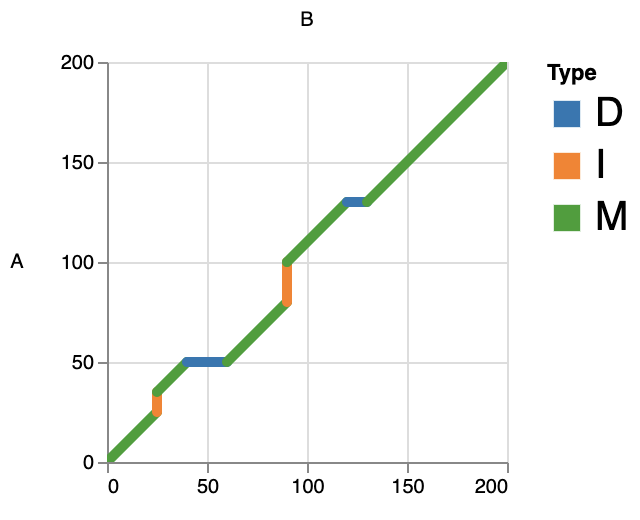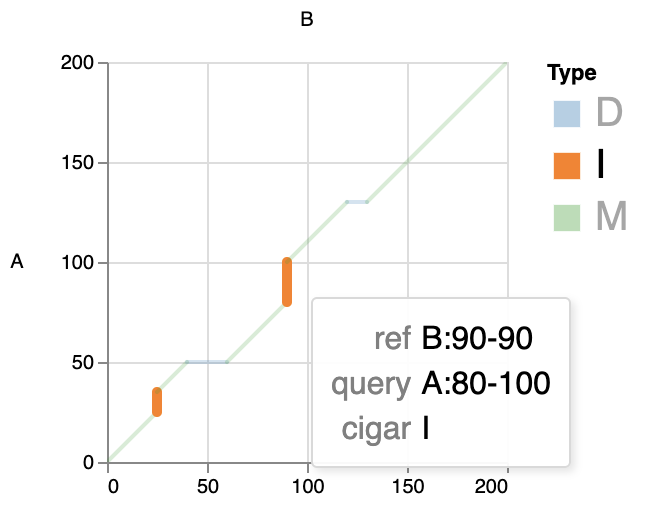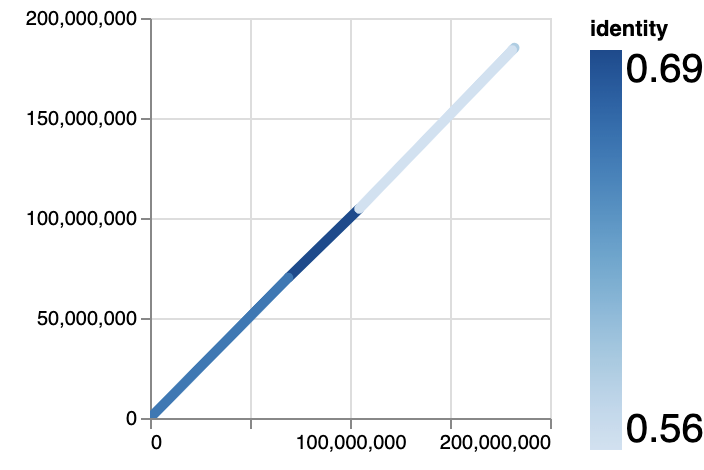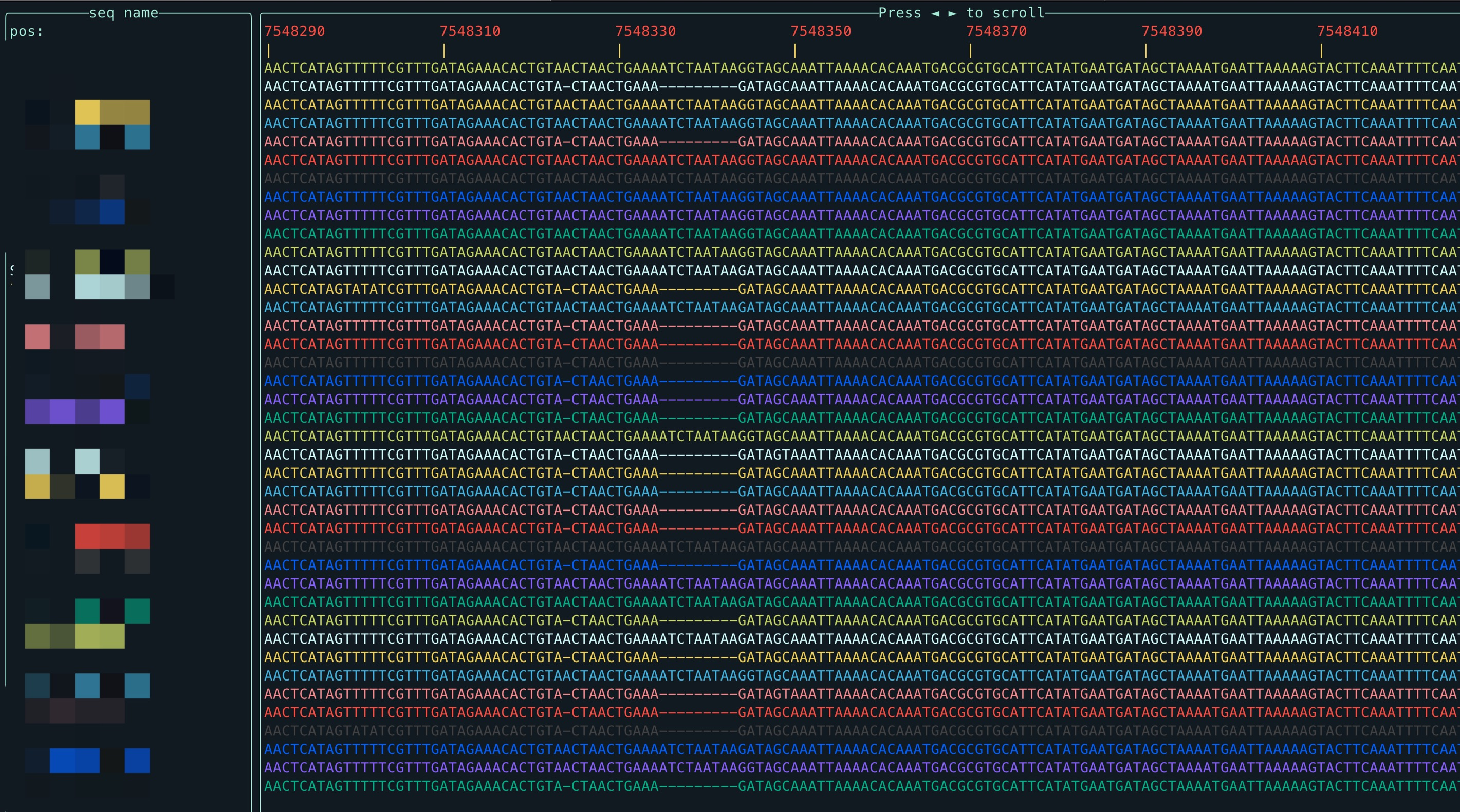Whole Genome Alignment Tools

A Rust library and tools for whole genome alignment files
Table of Contents
-
- Usage
- Auto-Completion for easy-use
- Format Conversion
- Dotplot for MAF/PAF file
- Extract regions from MAF file
- View MAF file in terminal
- Call Variants from MAF file
- Chunk MAF file by length
- Statistics for MAF/PAF file
- Validate and fix PAF file
- Filter records for MAF/PAF file
- Rename MAF file
- PAF Coverage for all-to-all alignment
- Generate pseudo MAF from all-to-all PAF
Citation
If you use wgatools in your research, please cite:
Install
Conda
conda install wgatools -c biocondaBuild from source
git clone https://github.com/wjwei-handsome/wgatools.git
cd wgatools
cargo build --releaseor just install from git:
cargo install --git https://github.com/wjwei-handsome/wgatools.gitNix
A nix flake is also available. You can build from within the repo like this:
nix build .#wgatoolsOr directly install from github:
nix profile install github:wjwei-handsome/wgatoolsDocker and Singularity
Using nix, we can derive docker and singularity images:
nix build .#dockerImageFirst, we load the docker image into the local daemon:
docker load < resultIt's then possible to pack up a singularity image:
singularity build wgatools-$(git log -1 --format=%h --abbrev=8).sif docker-daemon://wgatools:latestThis can be useful when running on HPCs where it might be difficult to build wgatools.
Tools
Usage
> wgatools
wgatools -- a cross-platform and ultrafast toolkit for Whole Genome Alignment Files manipulation
Version: 0.1.0
Authors: Wenjie Wei <wjwei9908@gmail.com>
Usage: wgatools [OPTIONS] <COMMAND>
Commands:
maf2paf Convert MAF format to PAF format [aliases: m2p]
maf2chain Convert MAF format to Chain format [aliases: m2c]
paf2maf Convert PAF format to MAF format [aliases: p2m]
paf2chain Convert PAF format to Chain format [aliases: p2c]
chain2maf Convert Chain format to MAF format [aliases: c2m]
chain2paf Convert Chain format to PAF format [aliases: c2p]
maf-index Build index for MAF file [aliases: mi]
maf-ext Extract specific region from MAF file with index [aliases: me]
chunk Chunk MAF file by length [aliases: ch]
call Call Variants from MAF file [aliases: c]
tview View MAF file in terminal [aliases: tv]
stat Statistics for Alignment file [aliases: st]
dotplot Plot dotplot for Alignment file [aliases: dp]
filter Filter records for Alignment file [aliases: fl]
rename Rename MAF records with prefix [aliases: rn]
maf2sam DEV: maf2sam [aliases: m2s]
pafcov Calculate coverage for PAF file [aliases: pc]
pafpseudo Generate pesudo-maf for divergence analysis from PAF file [aliases: pp]
gen-completion Generate completion script for shell [aliases: gc]
validate Validate and fix query&target position in PAF file by CIGAR [aliases: vf]
help Print this message or the help of the given subcommand(s)
Options:
-h, --help Print help (see more with '--help')
-V, --version Print version
GLOBAL:
-o, --outfile <OUTFILE> Output file ("-" for stdout), file name ending in .gz/.bz2/.xz will be compressed automatically [default: -]
-r, --rewrite Bool, if rewrite output file [default: false]
-t, --threads <THREADS> Threads, default 1 [default: 1]
-v, --verbose... Logging level [-v: Info, -vv: Debug, -vvv: Trace, defalut: Warn]Each subcommand could be used with -h or --help to get more information.
Auto-Completion for easy-use
wgatools gen-completion --shell fish > ~/.config/fish/completions/wgatools.fishReady to enjoy it!
Format Conversion
Three mainstream formats(PAF, MAF, CHAIN) can be converted to each other.
For example, to convert MAF to PAF:
wgatools maf2paf test.maf > test.pafor to convert PAF to MAF:
wgatools paf2maf test.paf --target target.fa --query query.fa > test.maf[!TIP] If you want to convert into MAF format, you should provide target and query genome sequence files in {.fa, .fa.gz}.
stdin and stdout are supported, so you can use pipes to chain commands together🪆:
cat test.maf | wgatools maf2paf | wgatools paf2maf -g target.fa -q query.fa > test.maf
wgatools paf2chain test.paf | wgatools chain2maf -g target.fa -q query.fa | wgatools maf2chain | wgatools chain2paf > funny.pafDotplot for MAF/PAF file
We provide two modes for plot, for example:
- BaseLevel

This mode can catch the alignment details in each record, such as matches, insertions and deletions. This can help us to better observe the local alignment.
wgatools dotplot -f paf test/testdotplot.paf > out.htmlBy default, INDELs smaller than 50bp are merged with adjacent match. You can also use the parameter -l, --length to specify the threshold.
In Interactive html, you can click on the legend to view only the types of interest, for example:

[!WARNING] NOTE: For better interactivity, the
zoomfunction is turned on. However, if there is too much data, the effect may be limited by your browser performance.
This simple example can be found in the test directory.
- Overview

Similar to common dotplot scripts, it will draw each align record and color it according to identity.
wgatools dotplot test.maf -m overview > overview.html😎 For vega and DIY hackers, we also provide output in json(vega schema) and csv formats.
Extract regions from MAF file
The line of MAF file is so long that it's hard to read. You can use maf-ext to extract specific region from MAF file with index:
wgatools maf-index test.maf
wgatools maf-extract test.maf -r chr1:1-10,chr2:66-888,chr3:100-50,chr_no:1-10,x:y-z[!TIP]
- Support multi-interval input, separated by commas
- Support
bedinput to specify interval- Mismatched interval are skipped and warned
View MAF file in terminal
View the MAF file in the terminal smoothly, and you can also specify the area to view:
wgatools tview test.maf
Press ◄► to slide left and right.
Press q to exit.
Press g to bring up the navigation window, where the left side is the optional sequence name, and the right side is the optional interval of the selected sequence, you can press Tab to switch the left and right selection windows, and you can press ▲▼ to select the sequence and interval
After input a legal interval, you can Press Enter to jump to the Destination. Or press Esc to exit the navigation window.
Call Variants from MAF file
The MAF format completely records the alignment of each base, so it can be used to identify variants.
Supported explicit varaint types:
- SNP
- INS
- DEL
- INV
The default parameter does not output SNP and short INS and DEL (<50). The example is as follows:
wgatools call test/test.maf -s -l0Output vcf:
##fileformat=VCFv4.4
##INFO=<ID=SVLEN,Number=A,Type=Integer,Description="Length of structural variant">
##INFO=<ID=SVTYPE,Number=1,Type=String,Description="Type of structural variant">
##INFO=<ID=END,Number=1,Type=Integer,Description="End position of the longest variant described in this record">
##INFO=<ID=INV_NEST,Number=1,Type=String,Description="Varations nested within inversion">
##FORMAT=<ID=QI,Number=1,Type=String,Description="Query informations">
##FORMAT=<ID=GT,Number=1,Type=String,Description="Genotype">
#CHROM POS ID REF ALT QUAL FILTER INFO FORMAT sample
ref.chr8 181470034 . TG T . . SVTYPE=DEL;SVLEN=1;END=181470035 GT:QI 1|1:query.chr8@181989530@181989530@P
ref.chr8 181470279 . G C . . . GT 1|1
ref.chr8 181470292 . A G . . . GT 1|1
ref.chr8 181470431 . C G . . . GT 1|1
ref.chr8 181470609 . C A . . . GT 1|1
ref.chr8 181470641 . C T . . . GT 1|1
ref.chr8 181470774 . A AAACCAAGA . . SVTYPE=INS;SVLEN=8;END=181470774 GT:QI 1|1:query.chr8@181990269@181990277@P
ref.chr8 181470793 . G T . . . GT 1|1
ref.chr8 181470894 . C T . . . GT 1|1
ref.chr8 181470895 . A T . . . GT 1|1
ref.chr8 181470903 . G A . . . GT 1|1[!IMPORTANT] This function does not support the identification of chromosomal rearrangements such as
DUP, as this requires the extraction of sequences for realignment.
Chunk MAF file by length
You can split a huge MAF record into multiple records by length:
wgatools chunk -l 100 test/test.maf -o chunked.mafStatistics for MAF/PAF file
wgatools stat test.maf
wgatools stat -f paf test.paf
wgatools stat test.mafValidate and fix PAF file
In some cases, the PAF file may be incorrect, such as the query and target postions are wrong, or CIGAR string is unmatch with sequences. You can use this command to validate and fix the PAF file:
## just validate
> wgatools validate wrong.paf
Total records: 2306
Query invalid records: 2283
Target invalid records: 80
Query invalid list:...
Target invalid list:...
## validate and fix
> wgatools validate wrong.paf -f happy.paf
Filter records for MAF/PAF file
You can filter some records by block length or query_size.
For example, to filter records that contig vs reference:
wgatools filter test.maf -q 1000000 > filt.mafFor all-to-all alignment paf file which produced by wfmash, you can filter some pairs by align-size:
wgatools filter all2all.paf -a 1000000 > filt.mafRename MAF file
In some practices, the chromosome name of ref and query are both called chr1, which is not easy to distinguish.
You can rename the sequence name in MAF file with a prefix:
wgatools rename --prefixs REF.,QUERY. input.maf > rename.mafPAF Coverage for all-to-all alignment
If you have alignment results for multiple genomes, you can use this command to calculate the alignment coverage on the genomes. It's optimized to use with wfmash output.
wgatools pafcov all.paf > all.cov.bedsGenerate pseudo MAF from all-to-all PAF
wgatools pafpseudo -f all.fa.gz all.paf -o out_dir -t 10
[!TIP] Practical processes and profile can refer to this pipleline and this paper
Library
Some simple reader and iterator for PAF, MAF and Chain files:
use wgatools::parser::paf::PafReader;
use wgatools::parser::maf::MAFReader;
use wgatools::parser::chain::ChainReader;
fn main() {
let mut mafreader = MAFReader::from_path("test.maf").unwrap();
for record in mafreader.records() {
let record = record.unwrap();
println!("{:?}", record);
}
/// ...
}Features
- use
nomto parse CIGAR string - use
rayonto accelerate the speed of conversions - use
ratatuito visualize MAF file in terminal - ...
Benchmark
We use the hyperfine to compare the speed of conversion between wgatools and another Rust-based tool paf2chain. The result is as follows (10 runs):
| command | mean(sec) | stddev | median | user | system | min | max |
|---|---|---|---|---|---|---|---|
| wgatools p2c Zm-CML333.paf -o foo | 3.69 | 0.36 | 3.71 | 3.46 | 0.14 | 3.25 | 4.09 |
| paf2chain --input Zm-CML333.paf > bar | 16.28 | 0.86 | 16.27 | 3.80 | 12.03 | 15.01 | 17.67 |
ROADMAP
- [ ] SAM converter
- [ ] Local improvement of alignment by re-alignment
- [ ] MAF -> GAF -> HAL
- [ ] output gvcf for variants
- [ ] call variants from PAF directly
Contributing
Feel free to dive in! Open an issue or submit PRs.
License
MIT License © WenjieWei

